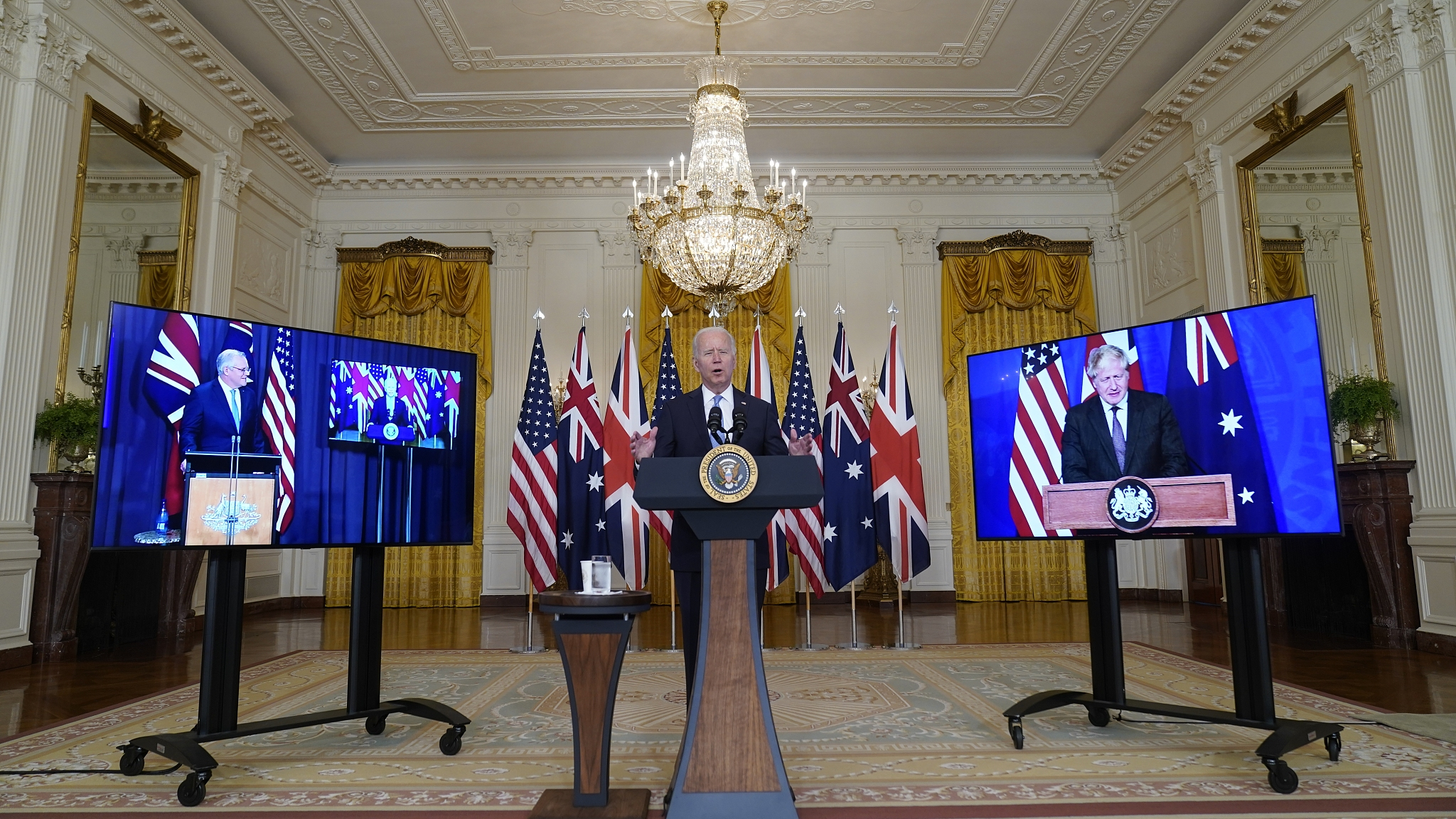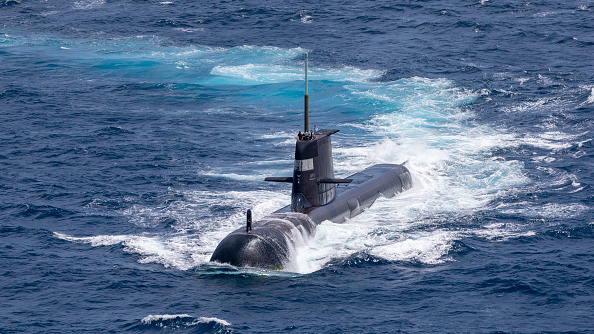
President Joe Biden, joined virtually by Australian Prime Minister Scott Morrison and British Prime Minister Boris Johnson, speaks about a national security initiative from the East Room of the White House in Washington, D.C., the U.S., September 15, 2021. /CFP
President Joe Biden, joined virtually by Australian Prime Minister Scott Morrison and British Prime Minister Boris Johnson, speaks about a national security initiative from the East Room of the White House in Washington, D.C., the U.S., September 15, 2021. /CFP
Editor's note: Sumesh Shiwakoty , a policy analyst and commentator, currently serves as a board member and South Asia director for the U.S. Department of State-funded California-based non-profit "United by Love," has worked in the past with the World Policy Institute in New York, has received a research grant from the Andrew W. Mellon Foundation, and written analyses for publications including The National Interest, The Diplomat, and The Times of India. The article reflects the author's opinions and not necessarily the views of CGTN.
In his announcement of AUKUS, the trilateral security pact between the U.S., UK, and Australia, U.S. President Joe Biden stated that the deal will ensure "peace and stability in the Indo-Pacific over the long term." President Biden is wrong. If anything, the opposite is true.
AUKUS will exacerbate the arms race while seriously undermining the current international nuclear nonproliferation governments. The deal will further militarize the Pacific. Only the military-industrial complexes of the three nations will benefit, while those who will pay the ultimate price will be the people of Pacific island nations.
Many of the world's leading nuclear policy experts and scholars have expressed concern that AUKUS will cause the proliferation of highly sensitive military nuclear technology. To operate nuclear-powered submarines under this deal, Australia must be the first to exploit a loophole under the 1970 Nuclear Non-Proliferation Treaty (NPT), which allows non-nuclear-weapons states to acquire nuclear-powered submarines and remove nuclear materials used for fuel from the inspection system of the International Atomic Energy Agency (IAEA).
We can assume from Australia's indication that its nuclear submarines will not need refueling that it will use highly enriched uranium (HEU) like that of the U.S. and the UK, instead of low enriched uranium. The danger for nuclear nonproliferation government is obvious, as currently, the American and the British nuclear submarines use HEU enriched above 90 percent, a similar concentration of uranium, for making nuclear weapons.
James Acton of the Carnegie Endowment for International Peace states that while it is improbable that Australia will acquire nuclear weapons, this "will set a damaging precedent," making it difficult for a nonproliferation government to deter future proliferators. He is right.
Other nuclear countries could exacerbate the arms race by exploiting this same loophole to supply nuclear technologies to countries that are interested in acquiring nuclear weapons. AUKUS will also heavily militarize the Pacific as it includes cooperation on underwater technologies to long-range strike capabilities. This will invite rival powers to militarize the Pacific further.
On the other hand, the AUKUS deal has alienated a close NATO ally of the U.S. and UK. Australia's unilateral cancellation of its $66 billion contracts to purchase diesel-powered submarines from the French defense contractor the Naval Group is a severe economic setback to the French defense industry.
France showed its anger by recalling its ambassadors from Washington and Canberra, having never before recalled an ambassador from the U.S. The French foreign minister called the deal a "stab in the back," while French opposition politicians asked France to leave NATO.

Royal Australian Navy submarine HMAS Rankin is seen during AUSINDEX 21, a biennial maritime exercise between the Royal Australian Navy and the Indian Navy in waters off Darwin, Australia, September 5, 2021. /Getty
Royal Australian Navy submarine HMAS Rankin is seen during AUSINDEX 21, a biennial maritime exercise between the Royal Australian Navy and the Indian Navy in waters off Darwin, Australia, September 5, 2021. /Getty
If there were really a military threat of the gravity that Biden would like us to believe in the Indo-Pacific, he would have included France, whose Indo-Pacific territory has two million citizens and 7,000 troops, and whose alliance with the U.S. dates to 1778, to counter this security threat mutually.
With Boris Johnson, the British Prime Minister, publicly touting in the British parliament that the AUKUS deal will add jobs across his country, it seems that economic incentives to the U.S. and the UK outweigh any perceived security concerns in the region.
That the profit motives of the military industry underlie foreign policy decisions seems incontrovertible. The failed 20-year U.S. occupation of Afghanistan was still a big victory for U.S. military contractors. A Brown University report showed the price since 2001 to American taxpayers for the U.S. military operations globally was around $8 trillion. During that period, the share prices of the top five U.S. defense contractors increased three to 12 times, outperforming overall stock markets by 58 percent.
Meanwhile, the people of the Pacific Island nations still live with the environmental consequences of nuclear testing decades ago by Americans, British and French and have worked hard to keep the Pacific nuclear-free going forward. They were already concerned that Japan's plan to discard treated nuclear wastewater into the Pacific would adversely affect their habitat.
Now they have more to worry about: the nuclear submarine deal contravenes their long-standing dream of making the region a nuclear-free zone. They now confront the possibility that any accidental spillover of nuclear waste from submarines will poison their habitat.
Other countries in the regions are also protesting the AUKUS deal. For example, New Zealand has stated that the nuclear submarine will not be welcome in their waters, and Malaysia and Indonesia have jointly raised concern that the deal will heighten the tension and arms race in the region.
But for the AUKUS nations which seek hegemony and are addicted to the profit of military-industrial complexes, these concerns of Pacific nations do not seem to matter much. In the age of pressing transnational problems like climate change and nuclear proliferation, any country which seeks hegemony and a return to the 19th century model of balance of power is engaged in primitive, self-defeating thinking.
(If you want to contribute and have specific expertise, please contact us at opinions@cgtn.com.)

